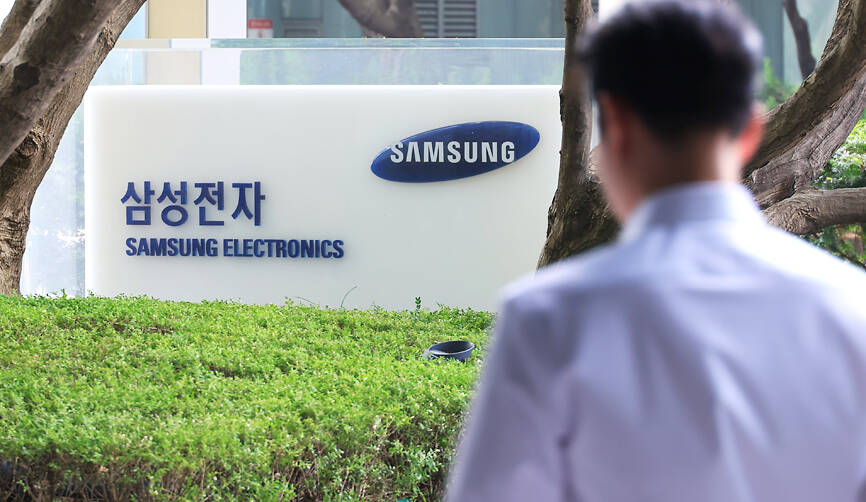Tesla Inc chief executive officer Elon Musk yesterday said that Samsung Electronics Co would provide his company with its next-generation AI6 chips, following the South Korean firm’s announcement of a US$16.5 billion deal.
Samsung said in a regulatory filing yesterday that it had secured an eight-year agreement, without naming the client, describing it only as a “major global company.”
Under the deal, the partnership — effective from Thursday last week — runs through the end of 2033.

Photo: EPA
“Samsung’s giant new Texas fab will be dedicated to making Tesla’s next-generation AI6 chip. The strategic importance of this is hard to overstate,” Musk wrote on X.
“Samsung agreed to allow Tesla to assist in maximizing manufacturing efficiency,” he added, calling it a “critical point” in striking the deal.
“I will walk the line personally to accelerate the pace of progress,” he said, citing how Samsung’s Texas plant was “conveniently located not far from my house.”
The deal represents about 7.6 percent of Samsung’s annual sales for last year, the company said.
The agreement is expected to provide a major boost to Samsung, which has faced headwinds in its foundry business, lagging rivals SK Hynix Inc and Taiwan Semiconductor Manufacturing Co (TSMC, 台積電) in the race for cutting-edge artificial intelligence chips.
Samsung earlier this month said that it expected operating profit to fall 56 percent year-on-year and 31 percent from the previous quarter, citing a slump in its core semiconductor division.
Experts have attributed the decline to weaknesses in its foundry operations, which involve contract-based manufacturing of chips designed by other companies.
TSMC held a dominant share of 67.6 percent of the global foundry market in the first quarter this year, up from 67.1 percent in the previous quarter, Taipei-based researcher TrendForce Corp (集邦科技) reported last month.
Samsung’s share slipped to 7.7 percent from 8.1 percent in the previous quarter.

NEW IDENTITY: Known for its software, India has expanded into hardware, with its semiconductor industry growing from US$38bn in 2023 to US$45bn to US$50bn India on Saturday inaugurated its first semiconductor assembly and test facility, a milestone in the government’s push to reduce dependence on foreign chipmakers and stake a claim in a sector dominated by China. Indian Prime Minister Narendra Modi opened US firm Micron Technology Inc’s semiconductor assembly, test and packaging unit in his home state of Gujarat, hailing the “dawn of a new era” for India’s technology ambitions. “When young Indians look back in the future, they will see this decade as the turning point in our tech future,” Modi told the event, which was broadcast on his YouTube channel. The plant would convert

‘SEISMIC SHIFT’: The researcher forecast there would be about 1.1 billion mobile shipments this year, down from 1.26 billion the prior year and erasing years of gains The global smartphone market is expected to contract 12.9 percent this year due to the unprecedented memorychip shortage, marking “a crisis like no other,” researcher International Data Corp (IDC) said. The new forecast, a dramatic revision down from earlier estimates, gives the latest accounting of the ongoing memory crunch that is affecting every corner of the electronics industry. The demand for advanced memory to power artificial intelligence (AI) tasks has drained global supply until well into next year and jeopardizes the business model of many smartphone makers. IDC forecast about 1.1 billion mobile shipments this year, down from 1.26 billion the prior

People stand in a Pokemon store in Tokyo on Thursday. One of the world highest-grossing franchises is celebrated its 30th anniversary yesterday.

Zimbabwe’s ban on raw lithium exports is forcing Chinese miners to rethink their strategy, speeding up plans to process the metal locally instead of shipping it to China’s vast rechargeable battery industry. The country is Africa’s largest lithium producer and has one of the world’s largest reserves, according to the US Geological Survey (USGS). Zimbabwe already banned the export of lithium ore in 2022 and last year announced it would halt exports of lithium concentrates from January next year. However, on Wednesday it imposed the ban with immediate effect, leaving unclear what the lithium mining sector would do in the